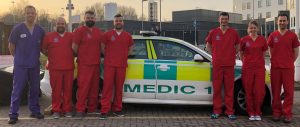Template File: /www/wp-content/themes/stn2017/single.php | Template Hierarchy
WP version: 6.4.4
PHP version 8.2.17
Joel Symonds, Advanced Critical Care Practitioner, tells us about this exciting project.
In November 2018, I was privileged to be accepted as a trainee Advanced Critical Care Practitioner with the Scottish Ambulance Service and Scottish Trauma Network. I’ve worked for the Scottish Ambulance Service since joining as a “Direct Entrant” in 2006, originally at Edinburgh North Station. Since then, I’ve worked as a 3RU Paramedic, A&E Team Leader and Specialist Paramedic, while also working with Edinburgh Royal Infirmary’s EMERGE Research Group. As soon as I heard about the development of the Advanced Practitioner role, I knew I wanted to be involved; the role is such a great mix of enhanced clinical skills and knowledge with enormous opportunities for teaching, learning, research, publication and clinical leadership. Staffed by individuals from paramedic and nursing backgrounds, the team is truly multi-disciplinary with many team members bringing knowledge, abilities and experience to the table that far exceed the typical skill sets of their registered titles.
While Advanced Critical Care Practitioners have been practicing within hospital for many years, our role has a truly unique element, delivering both pre and in-hospital care and acting as a conduit between the two areas of clinical practice in this dual function.
Pre-hospitally, the team delivers “Yellow” enhanced care in the community on a single-crewed, independent basis, supporting ambulance crews at more challenging incidents, or those with the greatest clinical acuity and risk. While currently undergoing an intensive training programme in conjunction with Glasgow Caledonian University, once qualified the team will bring enhanced interventional skills, an expanded formulary and senior clinical decision making to serious incidents around South East Scotland. In addition to this, the role involves being embedded within Edinburgh Royal Infirmary’s Emergency Department, largely working within the Resuscitation, Anaesthetic and High Dependency areas and responding as part of ERI’s Medic One “Red” Trauma Team, working alongside an ED consultant and nurse.
The team have already proven themselves to be valuable additions to the running of the Emergency Department. Dressed in distinctive red scrubs, they occupy a unique space in the team that lies between both nursing and medical staff. In addition to this, their significant exposure to a steady stream of seriously ill and injured patients coming through the door has allowed the ACCPs to greatly increase and develop their patient assessment, clinical decision making and interventional skills, with particular focus on the management of the critically ill, the use of sedation and anaesthetics and the management of major trauma, all of which come further into play when responding with Medic One. The team are especially grateful to all the staff at ERI ED for making them feel so welcome, involved and supported as they establish themselves in this new position.
Crucially, however, there have been significant collaborative, supportive and educational benefits to Scottish Ambulance Service staff who bring patients into the resuscitation department. Handing over a seriously ill patient to a senior Emergency Medicine consultant can be a daunting process for some of our colleagues and many technicians and paramedics now seek out the “red shirt” for debrief, support and learning after more complex cases.
The six members of the team are approaching the end of their first semester of a two year Post Graduate course in Pre-Hospital Critical Care, aligned closely with the learning outcomes and skill sets developed for Advanced Retrieval Practitioners within Glasgow’s EMRS. Next semester’s training will further their emergency surgical capabilities and include training in specialist skills such as blood transfusion, advanced analgesia and care of specific patient groups.
Further discussion, questions and suggestions for collaboration are always welcomed, and any reader keen to find out more about the team and project are encouraged to contact us on scotamb.seapcritcare@nhs.net
